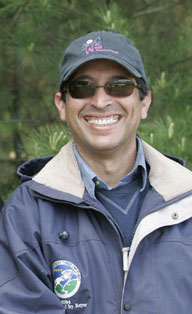 |
FEI 'I' Course Designer Hector Loyola conducts clinics from the course designer's perspective.
Photo by Cealy Tetley |
November 6, 2008 – Tucson, Arizona –
An innovative new concept, a course design clinic
aimed specifically at competitors was conducted by FEI ‘I’ course designer Hector Loyola on November 3 in Tucson, Arizona.
The full-day ‘Course Evaluation Clinic’, broken into theory and practical sessions, was held following the Tucson Fall Preview Horse Show where Loyola was acting as course designer. With Sunday’s Grand Prix course still set up, the clinic featured the course as its model. The objective of the clinic was to give competitors insight into the questions asked by course designers in order to make them stronger competitors.
“The clinic gives riders an opportunity to be face-to-face with the course designer and get first-hand insight into the questions that course designers are asking when they set a track,” explains Loyola who has conducted numerous clinics in his home country of Puerto Rico. “Every class is a competition between the course designer and the riders. By providing insight into course designing, the riders have another set of tools to use when they walk the course and make their plan.”
In the morning’s theory session, Loyola discussed various aspects of course design with the participants including rules, use of colour, construction of obstacles, the positioning of timers, footing, and walking related distances.
“One of the things that the participants find most interesting is learning about colour,” says Loyola, who has been a presenter at the Aachen School of Course Design in Germany. “For example, if a course designer uses a green poles in a jump set in a grass ring, or uses natural poles in a sand ring, it will make the poles ‘blind’ to the horse. Educating the riders and getting them to think about how the course will appear to their horse makes them more prepared as competitors. Riders need to think about and be aware of so much more than just how many strides are between each jump.”
Following the theory session, all of the participants walked the course and formulated their plan. Riders were then asked to mount their horses and put their plan into action. After jumping the course once according to their own plan, Loyola then worked with each rider, presenting alternate approaches to the course. Riders then jumped the course a second time following Loyola’s suggestions.
Participant Diane Nunn found the clinic to be both interesting and beneficial. Having ridden in Sunday’s Grand Prix, the clinic provided a unique opportunity for her to return on Monday and not only look at the course through the eyes of the course designer, but to ride the course again incorporating Loyola’s suggestions.
“Hector helped me to understand things that I would have never thought of,” said Nunn, who hails from Minnesota. “It was very interesting to learn why he did the things that he did with the course - it was very different reasoning than what I thought. The clinic was challenging, and he really made the participants think about their approach to the course. He took a lot of time to explain everything, he was very precise, and it made me realize how much time, effort and thought Hector, and other course designers as well, puts into course designing. I cannot say enough about it, it was hugely beneficial.”
“The point is not to critique anyone’s riding, but to get riders thinking about the different elements that go into course design and how that could effect their approach to the course,” explained Loyola. “Hopefully, all of the riders will apply the tools they learned in the clinic to their future course walks, and be able to ask their trainers more intelligent questions.”
As an FEI ‘I’ course designer, Loyola regularly sets tracks in North, Central and South America and has course designed at such shows as the Winter Equestrian Festival in Wellington, FL, and the Equifest Spectacular at Lamplight in Illinois, featuring the $50,000 Wachovia Grand Prix. He is the technical delegate for the 2008 FEI Children’s Final in Colombia. A graduate of Johnson and Wales University in Rhode Island, Loyola holds a Bachelor degree in Equine Business Management and Riding as well as an associate degree in Equine Studies. For more information on course design or clinics, contact Hector Loyola at tel: 787 379-1887 or e-mail: hectorloyola@aol.com.


